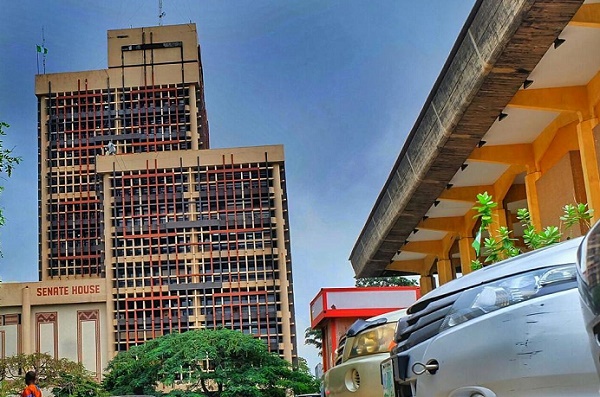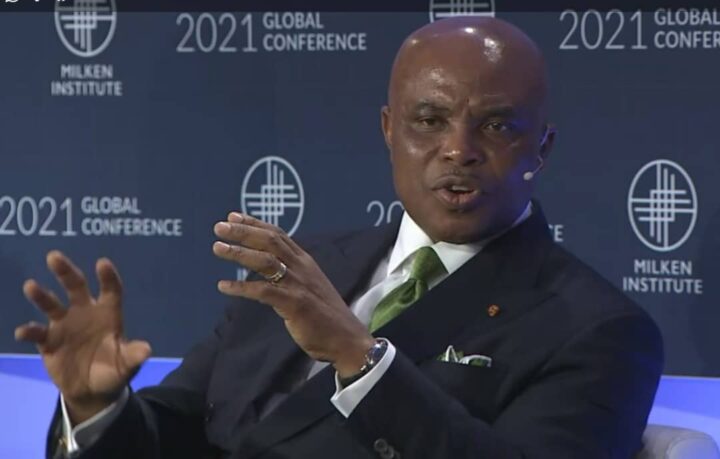Orji Kalu
The Economic and Financial Crimes Commission (EFCC) has appealed the ruling of a federal high which stopped the retrial of Orji Kalu, former governor of Abia state, on allegations of money laundering.
The EFCC had prosecuted Kalu alongside Ude Udeogu, a former director of finance and accounts with the Abia state government, and Kalu’s company, Slok Nigeria Limited, on 39 counts of fraud involving N7.1 billion at a federal high court in Lagos.
Mohammed Idris, who is now a justice of the court of appeal, had at the end of the trial, sentenced Kalu to 12 years’ imprisonment while Udeogu was sentenced to 10 years in prison.
The third defendant, Slok Nigeria Limited, was ordered to be wound up and its assets forfeited to the Nigerian government.
Advertisement
However, the supreme court on May 8, 2020, voided the trial and ordered a retrial following an appeal filed by Kalu’s co-defendant.
But Kalu asked the court to stop the commission from retrying him.
In a judgment delivered on September 29, Inyang Ekwo, an Abuja federal high court judge, prohibited the federal government or any of its agencies from retying the former governor.
Advertisement
In the nine-ground appeal filed against Kalu, the EFCC submitted that the judge erred in law when he, on one hand, agreed that the earlier trial, conviction and sentencing of Kalu was duly voided, but turned around to hold that a retrial would subject the ex-governor to double jeopardy.
The commission argued that the trial judge was wrong to have held “that the plea of autrefois acquit and autrefois convict (previously acquitted and previously convicted) and the principle of jeopardy availed the first respondent (Kalu) and that the re-trial of the respondent would amount to the violation of the provisions of Section 36 (9) and (10) of Constitution of the Federal Republic of Nigeria 1999 (as amended) and Section 238 of the Administration of Criminal Justice Act, 2015”.
“Having found that the conviction of the first respondent (Kalu) was delivered by a court without competent jurisdiction, it is absurd for the lower court to depart from the express provisions of section 36 (9) of the 1999 Constitution (as amended) and Section 238 of the ACJA, 2015 and then apply the principles of double jeopardy and autrefois convict,” EFCC said.
“The lower court failed to consider the decisions of the Supreme Court and the Court of Appeal cited before it to the effect that the doctrine of double jeopardy or autrefois convict is only applicable to a decision delivered by a court of competent jurisdiction.
Advertisement
“The evidence before the lower court was that the Supreme Court, in appeal No: SC.622C/2019 between Ude Jones Udeogu v. FRN, had nullified the proceedings conducted by Hon. Justice M.B. Idris which led to the convictions and sentence of all the respondents in this appeal.
“However, it was only Ude Jones Udeogu that was the appellant. Since it was a joint trial of all the respondents, the first respondent, by his motion filed on 15th May, 2020 prayed the Federal High Court presided over by Justice A.M. Liman that the proceedings that led to his conviction be nullified on the ground that Hon. Justice M.B. Idris, JCA lacks jurisdiction to deliver the judgment in line with the decision of the Supreme Court.
“The pronouncement of the Supreme Court as to the competence of the trial conducted by Hon. Justice M.B. Idris and the re-trial order in appeal No: SC.622C/2019 was limited to the said second respondent herein (Udeogu).
“The first respondent took advantage of the decision of the Supreme Court in appeal No: SC.622C/2019 and filed a motion before Hon. Justice A.M. Liman that since he was tried jointly with the other respondents and in view of the decision of the supreme court, that his conviction and sentence should also be declared a nullity.
Advertisement
“The lower court permitted the first respondent to rely on the decision of the Supreme Court in appeal No: SC.622C/2019 to take benefit of the order of nullity made by the Supreme Court on the judgment of Hon. Justice M.B. Idris and to avoid the burden of a retrial order made by the Supreme Court.
“The law will not permit the first respondent to approbate and reprobate at the same time.”
Advertisement






